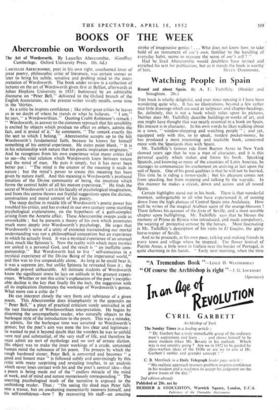BOOKS OF THE WEEK
Abercrombie on Wordsworth
The Art of Wordsworth. By Lascelles Abercrombie. (Geoffrey Cumberlege. Oxford University Press. 10s. 6d.) LASCELLES ABERCROMBIE, poet in his own right, unashamed lover of great poetry, philosophic critic of literature, was certain sooner or later to bring his subtle, sensitive and probing mind to the inter- pretation of Wordsworth. The book under review is a collection of lectures on the art of Wordsworth given first at Belfast, afterwards at Johns Hopkins University in 1935; buttressed by an admirable discourse on "Peter Bell," delivered to the Oxford branch of the English Association, as the present writer vividly recalls, some time in the 'thirties.
As a critic he inspires confidence ; like other great critics he leaves us in no doubt of where he stands or what he believes. " I am," he says," a Wordsworthian." Quoting Crabb Robinson's remark : " Wordsworth, in answer to the common reproach that his sensibility is excited by objects which produce no effect on others, admits the fact, and is proud of it," he comments, " The remark exactly fits the sect to which I belong." Abercrombie accepts up to the hilt Wordsworth's fundamental faith, because he knows for himself something of his central experience. He states point blank, "it is in his relationship with nature that his poetic inspiration originates." And he recognises from his own experience what many critics fail to see—the vital relation which Wordsworth knew between nature and the mind of man. He puts it simply, but it has never been better put : "The mind is the creator of the meaning it reads in nature 5 • but the mind's power to create this meaning has been 13 given y nature itself. And this meaning is Wordsworth's profound intuition of the Divine community of being, the intuition which forms the central habit of all his mature experience." He finds the secret of Wordsworth's art in his faculty of psychological imagination, and from this centre throws out fruitful suggestions upon the diction, construction and moral content of his poetry.
The steep decline in middle life of Wordsworth's poetic power has troubled his critics, and has evoked in our own century some startling psychological explanations, on the hypothesis of a guilt-complex arising from the Annette affair. These Abercrombie sweeps aside as unworkable ; but he presents a theory of his own which penetrates much more deeply into Wordsworth's psychology. He urges that Wordsworth's sense of a unity of existence transcending our mortal understanding was not a philosophical conception but an experience in which he actually lived. It was a mystical experience of an unusual kind, much like Spinoza's. Now the reality with which most mystics are united is a personal God, and the result is " an ineffable com- panionship." But Wordsworth had to live " self-conscious in a mystical experience of the Divine Being of the impersonal world," and this was to live unspeakably alone. As long as he could bear it, it was a supreme joy, but unlike Spinoza he retreated from it ; the solitude proved unbearable. All intimate students of Wordsworth know the significant stress he lays on solitude in his greatest experi- ences. Whether or not this critic's explanation of the poet's inexplic- able decline is the key that finally fits the lock, the suggestion with all its implication illuminates the workings of Wordsworth's genius. What more can a critic do ?
He can interpret closely the very form and substance of a given poem. This Abercrombie does triumphantly in the appendix on "Peter Bell," a piece of practical criticism surely unrivalled in all the vast literature of Wordsworthian interpretation. He begins by disarming the unsympathetic reader, who naturally objects to the burlesque style of the introduction to the poem. This was a mistake, he admits, for the burlesque tone was unsuited to Wordsworth's genius; but the poet's aim was none the less clear and legitimate ; he wanted to put it beyond doubt that the wonders he was to unfold were real and substantial, of the very stuff of life, and therefore he must admit no sort of mythology and no sort of ornate diction. His object was to make the inner workings of a crude, untutored human mind the substance of his poem. The process by which the rough hardened sinner, Peter Bell, is converted and becomes " a good and honest man " is followed subtly and convincingly by this critic with many surprising and revealing touches, in an analysis which never loses contact with his and the poet's central idea—that a poem is being made out of the " endless• miracle of the mind at work, and of mind and nature mysteriously corresponding." The unerring psychological truth of the narrative is exposed to the unthinking reader. Thus : "On seeing the dead man Peter falls into a trance, but on awakening momentarily recovers himself, and his self-confidence--how? By recovering his staff—an amazing
stroke of imaginative genius ! . . . Who does not know how, to take' hold of an instrument of one's own; familiar to the handling of everyday habit, seems to reassure the sense of one's se/ f? "
Had he lived Abercrombie would doubtless have revised and ' enriched his text for publication, but as it stands the book is worthy


































 Previous page
Previous page